
30 Sqn D.H.9A at 9700 ft over Peri Magurum.
A friend has alerted me to a thread on the Something Awful forums (thanks, Mike!) One of the users has access to a collection of photos taken by an RAF sergeant who served with 30 Squadron in the early 1920s, which unfortunately looks like it is going to be sold and broken up. But luckily scans of them of them are being posted first, and there are some fantastic pictures of Iraq, Palestine and Egypt, many taken from the air, including several of an air raid carried out against a Kurdish town — air control in action! Naturally, I can’t resist posting some of the best ones here, but there are plenty more on the original thread, including the Holy Land, the Suez Canal, dusky maidens, scorpions, a cross-Africa flight from Cairo to Nigeria, and the promise of more to come. I’ve had to shrink these to fit them onto the page, so click on them to see the full-size version.
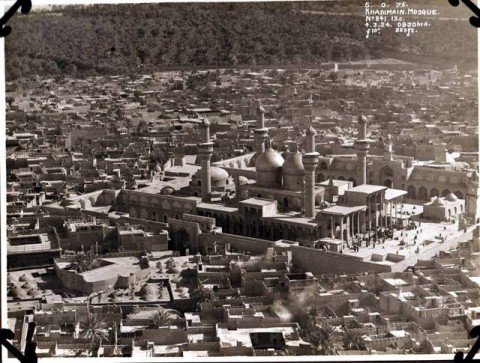
This is the Khadimain Mosque in Baghdad, 4 March 1924.
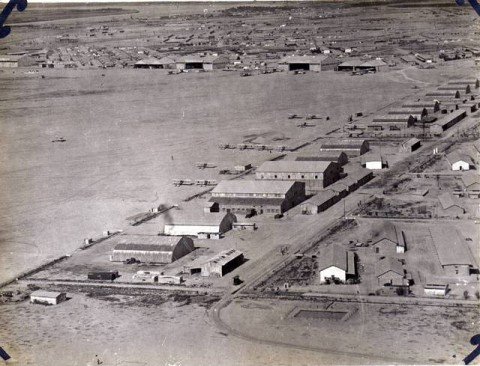
RAF Hinaidi, the main aerodrome in Baghdad.
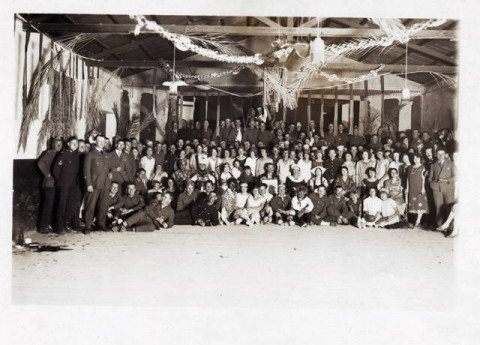
The extended 30 Sqn family, including wives and children.

A fine study of the D.H.9A, the RAF’s workhorse imperial policing aircraft in the early 1920s, over the Bazian Pass in Kurdistan. The pilot is Flight Lieutenant Kinkead, a First World War fighter ace who was later killed in training for a Schneider Trophy attempt.

Kinkead again, alongside Squadron Leader Robb and Flight Officer French.
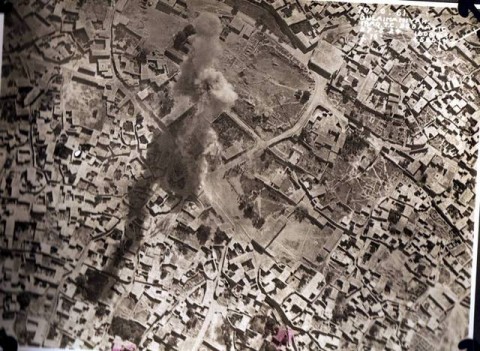
And this is what they were all out in Iraq for. A 520 lb bomb being dropped on Sulaimaniyah in Kurdistan, 27 May 1924 …

… and a 230 lb bomb the next morning …

… and the final results. These three photos are all of the same general area, taken from different angles. It doesn’t look particularly devastated, but then the point was not destruction but punishment. It’s interesting that Sulaimaniyah was clearly a fairly substantial town at that time, which contrasts with the impression given by many contemporary accounts that villages and encampments — tents and camels — were the usual targets of police actions.
This would be a good place to mention that a conference on Air Power, Insurgency and the ‘War on Terror’ is being held at RAF Cranwell on 22-3 August 2007 (thanks to Dan Todman for the pointer). It’s not purely a history conference, but they are looking for ‘Historical case studies of air power against insurgencies’, of which the British experience of air control in Iraq would be a prime example. Deadline for abstracts is 1 November.
Update: good news — the album won’t be broken up, nor will it be sold (it might be donated, one day). And here’s one last picture, from one of the later posts:
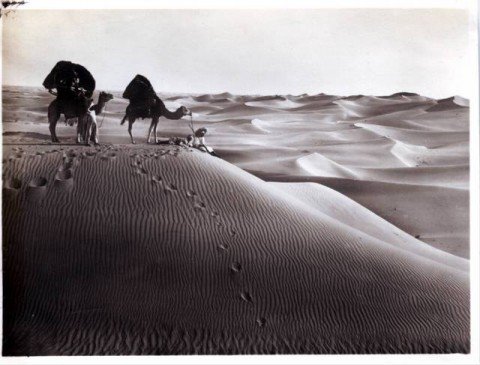
![]() This work is licensed under a Creative Commons Attribution-NonCommercial-NoDerivatives 4.0 International License.
Permissions beyond the scope of this license may be available at http://airminded.org/copyright/.
This work is licensed under a Creative Commons Attribution-NonCommercial-NoDerivatives 4.0 International License.
Permissions beyond the scope of this license may be available at http://airminded.org/copyright/.

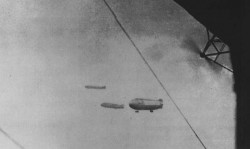

Absolutely. And these kind of images are rarer than from later or more well known events, so have a greater value. I’d recommend digitising, and they can then be shared online. Certainly I’d be very keen to see them, and perhaps help with publication.
Pingback: The portable airship hangar at Farnborough – Airminded
Pingback: Air control in pictures | Aeropinakes Press
Can anyone tell me where I can find this collection of images, especially those showing the bombing of Sulaimaniyah? I can’t access the page on the linked forum. Thank you
The original forum is long gone. I think your best bet is to trawl through the San Diego Air & Space Museum’s Edwin Newman Collection — which is online here. I know at least some of the photos in this post are in there, and I think some bombing ones, but maybe not the same ones. Good luck!
Thanks for your reply to my earlier question Brett. You mentioned two RAF officers having a critical opinion on the British bombing of the Kurds (L. E. O. Charlton, Philip Mumford). Do you have any sources you could share on this? I am working on a museum about Shaikh Mahmoud and the Kurdish resistance to the British occupation of Iraq in the 1920s. Much appreciated, Richard
Sorry for the very late reply, but sure! Charlton was a senior staff officer in the Iraq Command in 1923-24, during the air control campaign there, where he protested against the bombing of civilians. That was in private, though; I’m not sure, despite what I implied here, that he ever mounted a public attack against it. But in his 1931 autobiography, Charlton, he did give an account of his protest and the effect on his career. It’s a strange book in some ways, really just a series of vignettes written in the third person, but it apparently sold very well, so I assume it did raise awareness of his protest. (I don’t think know if anyone has ever tried to dig out the official or his CO’s side of the story.)
Philip Mumford also served as a RAF staff officer in Iraq, in intelligence. He offered an account of air control there in Humanity, Air Power and War: An Essay upon International Relations (1936), criticising it on both moral and practical grounds, as well as seeing it as a precedent for the general use of bombing of civilians in Europe.